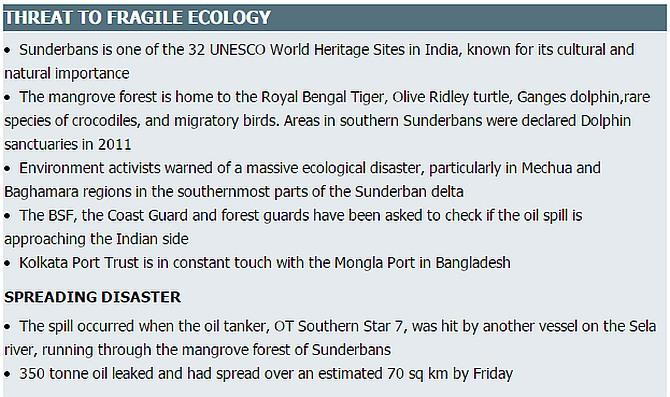 | « Back to article | Print this article |
 An ecological disaster is in the making in the Sunderbans, the world’s largest mangrove forest spanning across the Indo-Bangla border, after an oil tanker collided with an empty cargo vessel. The incident spilled nearly 350 tonnes of oil into the Sela river, threatening the survival of multiple species of flora and fauna.
An ecological disaster is in the making in the Sunderbans, the world’s largest mangrove forest spanning across the Indo-Bangla border, after an oil tanker collided with an empty cargo vessel. The incident spilled nearly 350 tonnes of oil into the Sela river, threatening the survival of multiple species of flora and fauna.
The collision sent Indian official agencies, including the West Bengal forest department, Border Security Force (BSF) and the Coast Guard, into a tizzy on speculation that the spillage might cross over to the Indian side of the forest.
The Sunderbans is one of the 32 UNESCO World Heritage Sites in India, known for its cultural and natural importance. The forest is home to the Royal Bengal Tiger, Olive Ridley turtle, Ganges dolphin and several migratory birds from Siberia, apart from rare species of crocodiles.
The tanker was reportedly on way to deliver the oil to a power plant in Gopalganj when struck by the other vessel on Tuesday in a sanctuary for dolphins, including the rare Irrawaddy species. The spill from the oil tanker, named OT Southern Star 7, had spread over an estimated 70 sq km by Friday.
The accident left at least 20 canals connected with the Sela river, apart from a major river, Pashur, affected even as the sunk tanker was salvaged on Thursday. The Bangladesh government has lodged a case against the owners of the two vessels and sent four navy ships to deal with the spill.
Environment activists warned of a massive ecological disaster due to the spill, particularly in the Smechua and Baghamara regions in the southernmost parts of the Sunderban delta, where individual rivers meet the sea. Local officials said a close tab is being kept on the areas likely
